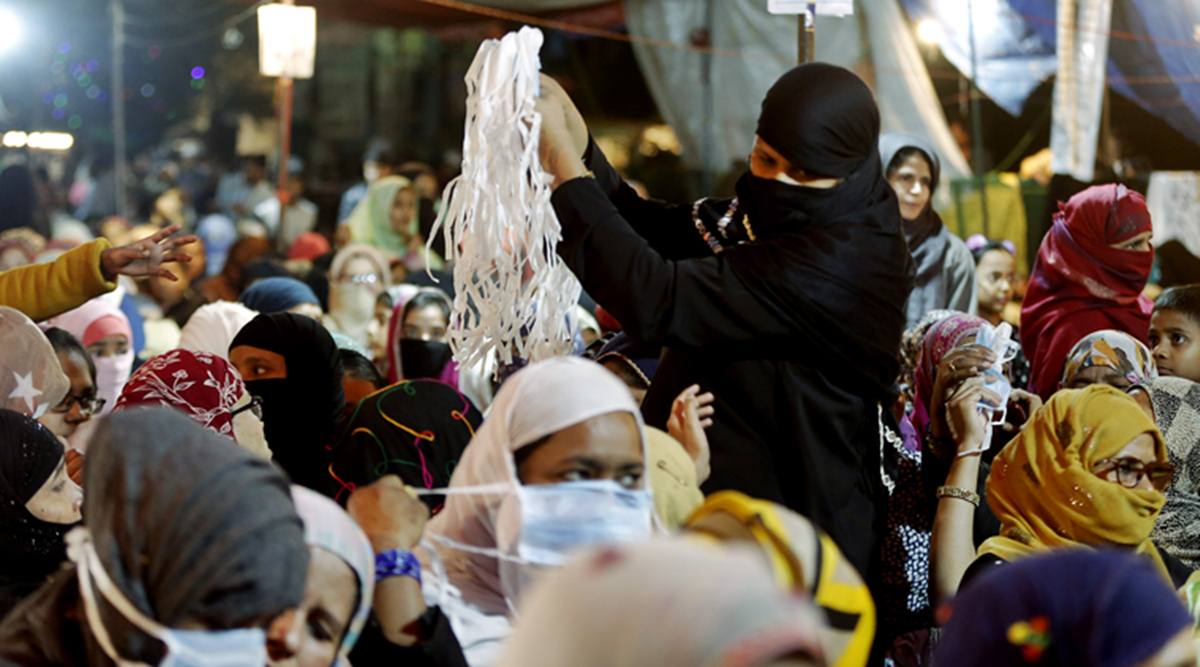 Women, particularly Muslim women, were on the frontlines of the anti-CAA protests. (File)
Women, particularly Muslim women, were on the frontlines of the anti-CAA protests. (File) January 2022: Bulli Bai deals, where Muslim women, particularly those who have been visible and articulate, were being auctioned, appeared on GitHub. A similar tool called Sulli Deals had appeared on GitHub in July 2021.
January 2021: While hearing petitions challenging the constitutional validity of the farm laws, the then Chief Justice of the Supreme Court suggested that women and children should not participate in protests.
January 2020: Women, particularly Muslim women, were on the frontlines of the anti-CAA protests.
One might see women’s leadership in the anti-CAA protests as the culmination of the claims that they have been making to public space. Campaigns like those led by Blank Noise, the Why Loiter movement, Pinjra Tod, to name only some, have pushed back against restrictions on women’s mobility. The book Why Loiter? Women and Risk on Mumbai Streets that I co-wrote with Sameera Khan and Shilpa Ranade suggested loitering as a way for women to gain unconditional access to public space as citizens. Once a niche, even radical idea, loitering has now entered the feminist vocabulary of access to public space.
In the anti-CAA protests, women occupied public space as citizens defending citizenship rights. The country saw many leaderless, peaceful protests, like the one at Shaheen Bagh, several helmed by Muslim women. Eighty-two-year-old Bilkis Bano became an icon of the movement. At Jamia Millia Islamia in December 2019, two students, Ayesha Renna and Ladeeda Farzana, stood between the cops and one of their male friends who was being assaulted. The image of Renna’s raised index finger became symbolic of the resistance.
Only months before passing the Citizenship (Amendment) Act 2019, the government had passed the Muslim Women (Protection of Rights on Marriage) Act, 2019, which criminalises instant triple talaq, setting up Muslim women as victims of Muslim men and reminding one of postcolonial scholar Gayatri Chakravorty Spivak’s comment in regard to White men saving Brown women from Brown men. In August 2019, the government abrogated Article 370, revoking the special status of Jammu and Kashmir. Several ministers were reported as commenting on the possibility of buying land in Kashmir and marrying fair Kashmiri women. Muslim women are simultaneously clients of state largesse and the exoticised other to be claimed.
While a part of the anti-CAA protests was already taking place online, the pandemic virtually took away access to the streets for these protests. Relevantly, just as streets are seen as dangerous to women in the mainstream narrative, so also women are asked to be careful online. While almost every woman has a story of street sexual harassment, many also have stories of online harassment, stalking, and, in the case of the more visible and articulate ones, rape and death threats. In the Bulli Bai case, too, most of those targeted have been articulate and visible on social media. At the same time, there has been growing violence against Muslims and in December 2021, at a religious conclave, there were repeated calls to kill Indian Muslims.
All women are targeted online and Muslims have become increasingly unsafe in the country. Muslim women are marginalised and discriminated against both as Muslims and as women. They are seen as victims of their religion, community and men; as clients under the dubious protection of the state, but also simultaneously as pawns in the demonstration of Hindutva power and masculinity, who might be assaulted in order to show Muslim men their place, as seen, for instance, in the sexual violence against Muslim women in 2002 in Gujarat.
The visibility of Muslim women in public as articulate, fierce and brave, fundamentally shifts something about how they must be perceived. If they can be out on the streets, sleeping under the open sky for three months, then clearly they cannot be only the relentlessly oppressed and silenced victims. It is this claim to citizenship, to free speech, that has created no little discomfort.
Bulli Bai and Sulli Deals must be located within these larger events of the growing visibility of Muslim women and a growing atmosphere of intolerance to diversity and tolerance of hate speech and acts towards Muslims. They are a way of silencing both women and Muslims, demonstrating that neither is safe in contemporary India.
(Phadke is the co-author of Why Loiter? Women and Risk on Mumbai Streets)
- The Indian Express website has been rated GREEN for its credibility and trustworthiness by Newsguard, a global service that rates news sources for their journalistic standards.

